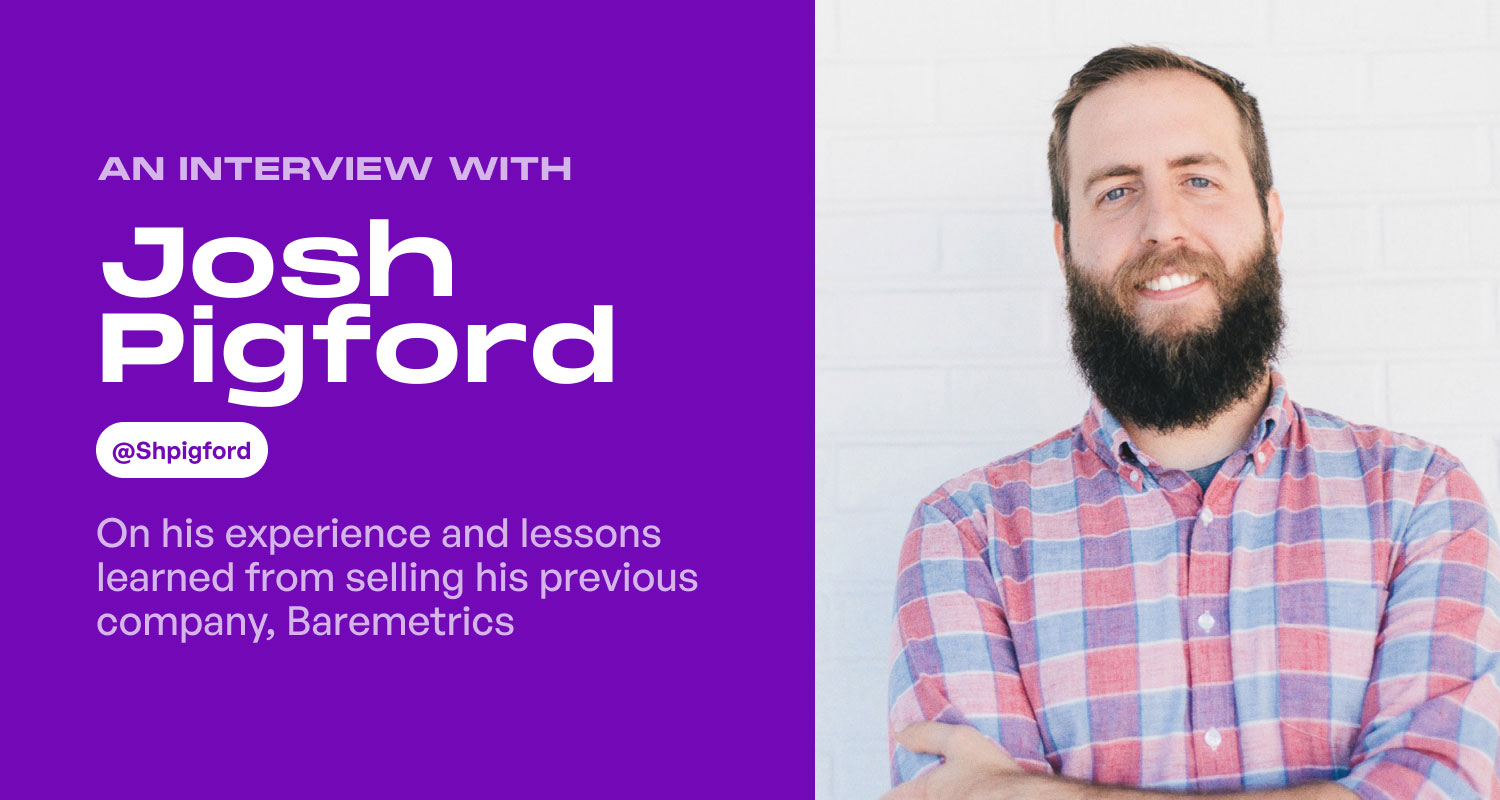10 things to do after you sell your business

Josh Pigford
Meet Mitchell.
He’s just sold his company for $22 million, and while he’s happy about the outcome — he’s flying blind when it comes to what to do with all that cash.
Mostly, Mitchell feels unprepared and uncertain about taking any next steps.
He’s spoken to a few different advisors (mainly through the investment accounts he already owns).
He’s posted on Reddit channels trying to seek help and validation for his decisions.
And in the hopes of navigating the changes, he even turned to Twitter to try and get advice from people dealing with a similar situation.
Yet, he still doesn’t feel confident about what to do with his money (let alone how to manage this transition into a new level of wealth).
Mitchell feels stuck.
And the uncertainty he’s experiencing is overwhelming — making it hard for him to feel good about the positive outcome of selling his first business.
Lifting the curtain: A behind the scenes look at selling your first business
If you’ve found yourself in a similar position to Mitchell or want to prepare yourself for a future sale — then it’s your lucky day!
Because we know how challenging this transition can be.
And with the help of Maybe’s in-house financial advisor, Travis, and our fearless leader Josh (who sold his company, Baremetrics, in 2020), we’ve got some solid suggestions for how to work through this next phase of life.
Without the hassles and headaches many people face when they cash out of their first biz.
Today we’re walking you through:
- Three things to consider in the lead up to the sale
- The #1 question to ask yourself BEFORE you sell
- Ten ways to manage yourself and your money post-exit
Plus, we’ve got a mini-interview with Maybe’s founder Josh Pigford where he shares his experience and lessons learned from the sale of his company.
Let’s dive in!
Three things to consider in the lead up to the sale
#1 Who to talk to
One of the many benefits of selling your first company is the payout you get from all the hard work you put into making something great.
But handling that money comes with its own set of challenges. And how you manage that transition can have a tremendous impact on how you’ll feel about the sale in the future.
Before, during, and after receiving your well-earned windfall — you’ll want to be talking to a few different people.
First and foremost, your spouse or significant other (if you’re in a relationship.)
Given you’ve both likely got ideas and expectations on what to do with the money — you want to get on the same page first.
Having a calm and healthy discussion about your expectations will help you identify any pain points and allow you to align your wants, needs, and vision for the future.
As far as outside advisors go — whether it’s:
- A CPA (to help you navigate the tax implications)
- A financial advisor (to help you reinvest and allocate your funds), or
- A counselor (to help you negotiate the thoughts, feelings, and emotions that might arise)
You want someone that can be objective, knows you and your desires to some level, has a fair amount of financial knowledge, and will speak the truth.
Most importantly, you need to understand the outside party's incentives and how those align with the outcomes you seek.
As Charlie Munger says, "Show me the incentive, and I will show you the outcome."
Knowing incentives are crucial. And will help you make better decisions based on the advice you get.
#2 Taxes
How your deal is structured can have a material impact on taxes and the amount of money you get to keep.
(This post might help you wrap your head around some of the more critical points.)
But instead of trying to wrangle with the tax implications yourself, we suggest getting yourself a trustworthy and reputable CPA to help you navigate this messy territory.
Taxes can be one of the most painful headaches when you’re negotiating your deal, so having someone in your corner — who knows the ins and outs — will be worth the fee!
#3 How to deal with the “windfall”
If you’ve never had a large sum of money to spend — it can be hard to imagine that this would be a problem.
But many people struggle with spending their money wisely.
Adjusting to life after a windfall is a significant transition. And you want to make your money decisions with as little emotion as possible.
A good rule of thumb is to avoid making any material changes to your lifestyle or making big purchases for about three to six months.
You want to ease yourself into having a heftier bank account and let your mind adjust to that. And then, once you’ve let the enormity of the changes simmer down — you’ll be in better shape to make smarter decisions.
The #1 question to answer BEFORE you sell
Ask: What are you enthusiastic about diving into after selling your business?
One of the most important things you can do to ensure you sell your business well has nothing to do with how much money you get for your company, but it has everything to do with your reasons for wanting to sell in the first place.
John Warrillow
In other words, what’s driving you to consider selling your business now?
There are many legitimate reasons to exit your company — but there are some that leave you with more regret than others. So make a point to think long and hard about your pull and push factors.
- Pull factors are what you’re excited to do next (new venture, personal projects, family adventure, etc.)
- Push factors are the things that are pushing you out of your business (often frustrating problems and issues that take a mental toll.)
As John Warrillow notes in his book, The Art of Selling Your Business — the best time to sell is when your driving reasons have more to do with pull factors.
John suggests creating a vision board that illustrates where you want to be after you sell to illuminate your pull factors.
The process is relatively simple:
- Cut pictures from magazines that symbolize the things you’re excited to go do
- Pin or stick them to a board
- Hang your vision board prominently in your home. To remind you (and your family) why you’re going through the process of selling your company.
Now that we’ve covered some pre-sale musts — let’s dig into your post-sale playbook. And some actions to take that will guarantee a smoother transition into this next phase of life.
Ten wise ways to manage yourself and your money after selling your company
#1 Take some time to reflect and celebrate

Humans suck at savoring their wins.
And if you’re an entrepreneur who’s just sold their company, you’re likely a go-getter who likes to be making things — and might find it difficult to stop and appreciate the magnitude of what you’ve accomplished.
As Martin Seligman notes in his book, Authentic Happiness:
The sheer speed of modern life and our extreme future-mindedness can sneak up on us and impoverish our present.
In other words, insufficient appreciation of such a massive event as selling your business can undermine your feelings of serenity, contentment, and satisfaction.
But there are four techniques you can adopt to promote more savoring of your big success:
- Sharing with others: you can seek out others to share the experience with and tell them how much you value the moment.
- Memory building: Take mental photos or physical souvenirs of the event, and reminisce about it later.
- Self-congratulation: don’t be afraid of pride! Allow yourself to indulge in the fact that you did something extraordinary.
- Absorption: let yourself get totally immersed in the moment. Do not remind yourself of other things you should be doing, wonder what comes next, or consider any improvements. Bask in the glory. You deserve it!
#2 Develop a mission for after you sell

We talked earlier about crafting a vision board for your life after exiting your company, and establishing a mission goes hand-in-hand with that kind of project.
When I asked Travis (Maybe’s in-house financial advisor) what establishing a mission might look like for an individual, he recommended working through the “Three Questions” (which we talk about in this post) and pull themes from your answers to create your big picture objectives.
Of course, working through the Three Questions exercise won’t necessarily reveal what your next mission is.
But it will provide clarity about what you consider important. And you’ll be able to use the priorities you establish in that exercise as non-negotiables for whatever moves you make next.
Spend some time talking with a trusted advisor (and your spouse) to explore what a good mission might be. This discussion should center around what makes you most excited from a work standpoint and what skill sets and strengths you have (and want) to exercise in the future.
You can then begin brainstorming ideas and looking at the numbers through the prism of those non-negotiables you came up with earlier.
#3 Consider these four questions for further clarity

The quality of your questions determines the quality of your life.
Tony Robbins
Being bolder and more open-minded with what we ask of ourselves can lead to tremendous discoveries that change everything.
Unfortunately, humans tend to avoid challenging questions in favor of answering narrower, easier questions instead. Or worse, they ask the right questions but self-censor their answers and lie to themselves about what they really want and believe.
So before you pose the following four questions, make a pact with yourself — to be honest with your answers (no matter how uncomfortable they feel). And take more than a few minutes to reflect on what you think.
You might even find it’s best to hash out your answers quickly for the first round, then revisit what you write later (after giving some time for your original thoughts to take shape.)
- What are your goals in life? We all have big dreams and deep wants that often get overlooked for other projects that provide less meaning and fulfillment. Take this time to consider the projects that call to you and can promote a significant increase in your well-being.
- What does freedom look like for you? This question is more about painting a picture of your ideal lifestyle. And less about how to go about spending any money you may be fortunate to earn. Yes, money allows for more freedom, but what does that “freedom” look like in your world?
- What do you want to do with the windfall? If you wish to spend your money on fun, materialistic things, list them out. If you want to open your rescue dog ranch, pop it down. This exercise is all about listing everything you’ve thought about doing, buying, or investing in to get it out of your head. There are no rules (but letting go of what you feel you “should” do is a helpful reminder.)
- How much are you planning to spend per year? Once you know how much your lifestyle costs and how long your money might last — it’s easier to decide where to invest and how to diversify your risk. The “Ideal Lifestyle Costing” exercise from Tim Ferriss is a valuable resource.
#4 Get yourself a gatekeeper who you can trust

Anytime someone sells a business, many people (family, friends, randoms from the internet…) think the individual has piles of money that will last forever, which is rarely the case.
Unfortunately, many first-time sellers haven’t had to navigate these tricky waters before and are often too emotionally attached to people to tell them “no.”
This is where it makes sense to have an objective third party who can help keep people away.
Of course, it’s up to you how you spend your money. But to help ease the discomfort of answering difficult requests from people you don’t want to disappoint — it’s best to have someone you trust act as a gatekeeper.
#5 Establish some context around the money

Is $1,000,000 a lot of money?
Predictably, the answer is — it depends.
If your spending is ~$60,000/year, it could be considered a lot of money. But if you’re 25, don't plan on working anymore, and spend $60,000 annually — it’s likely not going to last very long at all. And if you spend $200,000/year, your financial runway shortens again.
This is why establishing context is so important.
Now, if you’re like our friend Mitchell (who cashed out for a cool $22-million), you won’t have to worry too much about going broke (barring any truly terrible investments).
But if the sum you receive from your sale is more conservative — you want to make sure you’re setting reasonable expectations around your options — that align with your specific situation.
In other words, don’t blow it all on a new mansion and Masserati if you still plan to live off the proceeds for plenty of years to come.
#6 Slow things down to reduce decision fatigue

You don’t need to decide what to do with your money or your future immediately.
And if you’re feeling decision fatigue (there are a lot of choices and things to consider), then take a breather.
You have every right to take a month or two (or more!) to explore your options without making any promises. So don’t feel pressured to decide before you’re ready.
It’s perfectly okay to slow things down. Even if you miss some of that “time in the market.” It’s worth it to avoid making any rash decisions without due consideration.
#7 Avoid advisors who just want to take your money

We talked earlier about considering the incentives of the people giving you advice.
For instance, if you have a Vanguard account and talk to one of their advisors about what to do with your money, they’re obviously incentivized to get you to buy into more of their funds or consider an active-management option.
Making sure you factor in the motive behind any recommendations you’re getting is critical. And this is where seeking guidance from multiple sources can be an advantage.
Typically, crowdsourcing advice is a terrible approach (mostly because it’s hard to determine what drives some people’s beliefs and opinions around specific topics). But in this case, it pays to get some impartial (and often more practical) tips from people who have no incentive when it comes to what you do with your cash.
This is where seeking help in public forums like subreddits and, yes, the people of the Twitterverse — can be constructive.
Here’s what one Redditor had to say when he was dealing with a similar situation:
I trust this subreddit, which has no interest in making money off of me (except for the crypto zealots), more than someone who is trying to sell me overpriced products.
If you’re feeling pressured or pondering the legitimacy of an advisor’s advice — lean on loved ones or people who have no ulterior motive when it comes to the outcome of your decisions.
#8 Consider talking to a counselor

Depending on the amount of money you receive, it might be a good idea to talk to a counselor.
Having a lot of money brings challenges of its own, and you might need help working through that emotionally.
There are many expectations from friends, family, and society in general when someone is perceived to have a lot of money.
This can lead to debilitating pressure.
Finding a counselor or therapist specializing in financial or business scenarios will give you peace of mind and a safe place to talk about your problems and potential risks.
#9 Get yourself a well-written will and set up your trusts

If you’ve sold your company, you’re about to get inundated with offers for life insurance (welcome to the big leagues!)
And while life insurance is a good thing to have when you’re in a certain wealth bracket (and have dependents to worry about.) Once you hit that next level of wealth — setting up a will and organizing your trusts tends to be more prudent.
At any rate, given your net worth has significantly increased, it’s unlikely that your family will be left wanting. But what you don’t want to happen is for them to have to worry about all the paperwork and red tape when accessing any funds — if the worst should happen.
In the case of your death, it will be more beneficial to have a well-written will. And to have any trusts set up to make life easier on your loved ones.
#10 Diversify to reduce risk: Investment advice that works for any income level

If having a ton of money fills you with dread because you don’t know how to diversify it — then consider the age-old advice of:
Keep it simple, stupid.
Depending on your income and financial literacy level, getting yourself an advisor to help you alleviate the mental load might make sense.
But you absolutely can manage your money yourself, provided you follow a simple framework.
For instance, using the Boglehead’s three-fund portfolio — a straightforward investment strategy — leverages the ease of indexing and reduces risk with diversification. It’s also DIY-friendly.
And, as you’ll discover in the following interview with our founder, Josh — it works for giving you both peace of mind and solid gains.
The question you might like to consider here is:
Do you want to prioritize capital preservation or return maximization?
Answering that should help you steer your thoughts in the right direction.
Case Study: An interview with Maybe’s founder, Josh Pigford
On his experience and lessons learned from selling his company.

Tell me about your experience with “cashing out”
In November 2020, I sold a business analytics company I'd started seven years prior for $4 million. I walked away with $3.7 million in cash (pre-tax). No strings attached. No earn-out period. No performance-based caveats.
On the day of closing, I had no additional responsibilities and was no longer employed at my company.
Numbers aside, this was the outcome I wanted. I was ready to move on to other things, so the idea of sticking around for years just wasn't appealing to me. Overall it was a really positive experience.
What was the most annoying problem you faced?
The tax side of an acquisition can just get unbelievably messy.
There are asset sales and stock sales, and both have wildly different outcomes (thanks to taxes). At the beginning of the acquisition process, I knew about none of these things, so it was incredibly daunting to learn about it all and make sure I didn't unnecessarily leave a ton of money on the table.
What were some questions you posed to yourself at the time?
The main question was, "Will this outcome give my family the freedom to do what we want?"
Basically, "Do I ever need to work again?" It wasn't that I didn't want to ever work on anything again. That wasn't the case at all. I just didn't want to need to work. I wanted the freedom to try things, experiment, fail, and still not really worry about money.
Once that question was answered, I was ready to do the deal.
What was the smartest thing you felt you did with the money?
I went back and forth for a few months trying to decide exactly what I was comfortable with, but putting the majority of it in a simple Bogleheads portfolio has given me the peace of mind I wanted along with solid gains.
It's the right balance of risk/reward for me, so I'm not having to actively move money around...that's just not the type of investing I'm all that interested in doing at the moment.
What is something you wish you did with the money? Or what would you do differently a second time around?
For a little while, I tried my hand at picking single stocks. Don't do that.
2020 made everyone think they were an amazing investor. I wish I'd put everything in that Bogleheads portfolio on day one and just carried on with life.
How did you manage the tax side of things?
I talked to my CPA. It's a nightmare to try to handle it all yourself. Let the professionals handle it.
Who did you turn to for advice?
I talked to multiple financial planners to ensure I wasn't doing anything dumb. They helped my wife, and I prioritize things like paying off the house, maxing out certain accounts for tax purposes, and helped us put the breaks on for a bit, so we didn't do anything rash.
What was the most fun or interesting purchase you made post buy out?
A Tesla Model X. 🙂 And yes, the falcon wing doors are as impractical as you think they are.
What is your best advice for someone going through the same experience?
Get the advice of multiple people.
The more you sit there in your head thinking of things to do, the more likely you are to make a big mistake. You don't need to take every bit of advice people give, but getting gut checks from friends, family, and professionals is highly recommended...especially around taxes.
Can you share a little about your personal investment strategy? And did it change much post-buy-out?
Before the acquisition, I mainly dabbled. I had a few retirement and educational savings accounts for the kids and then slowly put money into individual stocks.
Post-acquisition, I got a real game plan in place in terms of investment allocation.
Right now, this is roughly how I break out assets:
- 80% — ETFs (with the majority in VTI, VBR, and VWO)
- 10% — Crypto
- 5% — Miscellaneous (startups, collectibles, etc.)
- 5% — Cash
Your post-sale playbook in a nutshell
It’s a huge accomplishment to sell your company and exit with a positive outcome.
And it doesn’t have to be a harrowing experience fraught with financial worry and endless unknowns and uncertainty.
Here’s a recap of the ten things that will maximize your experience and help you negotiate this new territory:
- Take some time to reflect and celebrate
- Develop a mission for after you sell
- Establish your financial goals and desired lifestyle
- Get yourself a gatekeeper who you can trust
- Establish some context around the money
- Slow things down to reduce decision fatigue
- Avoid advisors who just want to take your money
- Consider talking to a counselor
- Get yourself a well-written will and set up your trusts
- Diversify your investments to reduce risk
All that said, if you’ve recently sold your business, congratulations!
And if it’s something that’s likely to be in your future — hopefully, today’s post can help you approach this new era of your life with more confidence. And set you (and your family) on the right course toward more freedom, fun, and fulfillment.

Subscribe to get the latest updates right in your inbox!